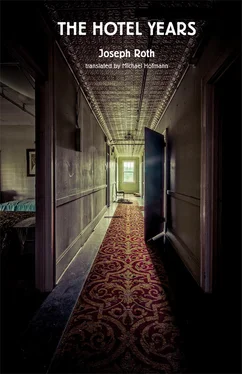Joseph Roth - The Hotel Years
Здесь есть возможность читать онлайн «Joseph Roth - The Hotel Years» весь текст электронной книги совершенно бесплатно (целиком полную версию без сокращений). В некоторых случаях можно слушать аудио, скачать через торрент в формате fb2 и присутствует краткое содержание. Год выпуска: 2015, Издательство: New Directions, Жанр: Прочая документальная литература, Прочая документальная литература, Культурология, Классическая проза, на английском языке. Описание произведения, (предисловие) а так же отзывы посетителей доступны на портале библиотеки ЛибКат.
- Название:The Hotel Years
- Автор:
- Издательство:New Directions
- Жанр:
- Год:2015
- ISBN:нет данных
- Рейтинг книги:3 / 5. Голосов: 1
-
Избранное:Добавить в избранное
- Отзывы:
-
Ваша оценка:
- 60
- 1
- 2
- 3
- 4
- 5
The Hotel Years: краткое содержание, описание и аннотация
Предлагаем к чтению аннотацию, описание, краткое содержание или предисловие (зависит от того, что написал сам автор книги «The Hotel Years»). Если вы не нашли необходимую информацию о книге — напишите в комментариях, мы постараемся отыскать её.
Frankfurter Zeitung
The Hotel Years — читать онлайн бесплатно полную книгу (весь текст) целиком
Ниже представлен текст книги, разбитый по страницам. Система сохранения места последней прочитанной страницы, позволяет с удобством читать онлайн бесплатно книгу «The Hotel Years», без необходимости каждый раз заново искать на чём Вы остановились. Поставьте закладку, и сможете в любой момент перейти на страницу, на которой закончили чтение.
Интервал:
Закладка:
III
He had the gift of intuition, and he dived into the future like others into the past. None of his professionally clairvoyant political contemporaries could see the future as well as he, who wrote: “From humanity through nationality to bestiality”. Not a bon mot , but a cry of fear in view of the looming disintegration of the monarchy, the final victory of awakening national barbarism. A cry of fear, palpable even in his victory cry to Radetzky: “All Austria is in your camp!” Actually, the hinterland was by no means still intact, the army alone represented it. Sadová cast an enormous shadow.‡ Austria triumphed at sea, against the Italians, at Lissa, not in the north, on land, against Germany.§ Not only the Austrian army, but the idea of the cosmopolitan German was smashed by his step-brother, the nationalist German, whose watchwords were: centralize, vanquish, oppress, rule — the opposite of the unfairly taken against Latin motto (because misunderstood and misapplied for domestic politics): Divide et impera! A subtle translation would be: decentralize and exercise influence! Not: divide and rule!
But how many — even then — had a proper understanding of Latin? Since Joseph II, aping Prussian centralism and enlightenment à la Frederick the Great, reined in the church and — surely without meaning to or knowing he was doing it — laid the moral and intellectual basis for the subsequent nationalist arrogance of German Austrians vis-à-vis the other Austrians (the “dictatorship” one might call it), one of the last refuges of universal Latinity was taken away, destroyed from above, even though the Catholic Emperor of course had none of the Protestant and Voltairean élan (the dynamism, as we say today) of Prussia. Grillparzer perhaps marks the beginning of the (political) Weltschmerz of the Austrian writer. At least, it was Grillparzer who gave it its classic expression: the anguish that understands that the Europe of the Middle Ages, Latin, universalist, suspending national differences — which in Austria still had force and being — was bound to be followed by the Europe of the Reformation and the French Revolution, the Europe of Napoleon and Bismarck. “From humanity through nationality to bestiality” means: from Erasmus through Luther, Frederick II, Napoleon, Bismarck, to the clutch of dictators we have today.
There were in those days few representatives of this (Catholic, political) Weltschmerz : liberalism was just beginning to convert the virtues of Austria into a stage set, lightness into flippancy; the actual “ heuriger ” is tart, but the poems and songs squeezed from it make a saccharine lemonade.∥ An acute conservative ear could discern the worldwide victory of the waltz and its offspring, the operettas of Lehár. From that “Grace” that takes its name from Greek antiquity and the Catholic gratia , was derived the export article: “Austrian cheer”; from etiquette, the stern daughter of Spain, any amount of bending-and-scraping compliancy. Can you blame Grillparzer!? He was surrounded by so much applause that he could only assert himself in lament. Empty laughter hurt him, privately as well as publicly. A minor transgression, the wrong word, even a clumsy gesture was enough to antagonize him. He reacted with extreme sensitivity — the most vengeful of all human weaknesses — with sometimes wounding arrogance (though never crossing the boundary into vulgarity). Such episodes only made him sadder. He suffered a hangover after wrath as others did after excess.
IV
Spain is Austria’s neighbour in history. The Counter-Reformation is a distant, calmer cousin to the Inquisition. The Habsburgs are Spaniards who took on the Austrian character and kept their Spanish ceremonials. These ceremonials, rigorous and assimilating at once, stand up to the rising tide of frivolity in Austria. The flag pairs black with yellow. The black watches over the yellow. The double eagle, golden, over both halves, watches over unity. Spain is Austria’s neighbour in history, and Grillparzer’s in literature.
He is the only German classic author of Spanish antecedents. Like the Habsburgs, he comes from Spain. He is Calderon’s descendant. It’s not just the form of the Ahnfrau .¶ It’s not the metre at all, more the cadence. It’s the attempt to couple the nervous clicking of the castanets with the steady iambs of German. A vain attempt, by the way. The Ahnfrau remains a classic oddity, mainstay of the Viennese Burgtheater and the school syllabus, but requiring the sanction of the k. and k. Ministry of Education and Culture.
Grillparzer subsequently gave up metre and rhythm, but not the melody of Spain. It flowed quite naturally into the native speech of Vienna. The grandezza of Spanish ceremonial was just as easily joined to the lightness of Austria. (If the percussion that opens the Radetzky March fails to remind you of castanets, then you have no ear for music.)
The melancholy of the narrative prose is not the golden Wehmut —the expression of Austrian sadness — but an expression of sternness. Picture a pleasant landscape in a black frame. The aphoristic prose is not satirical or campaigning as Grillparzer’s prose is, but furious. It is the aphoristic expression of a judge, a public prosecutor; or say it, an inquisitor, who is laying into his own people; sometimes with the resources of a card-carrying prophet. Never does bitterness turn into jeering. Never does a jibe become a pleasantry. Strict obedience to literary genre. Here too, here above all, the laws of the hierarchy. There is a Spanish anger when Grillparzer scolds. Austria knows no rage, it dwindles into a ticking-off: even rage finds its own tradesmen’s entrance.
Grillparzer’s anger was the expression of a subtle implacability softened by Latin Austria, and then amended by Spanish. His indignation was limited, personal, not meant as incitement or contagion, on the contrary: a rebellion of high-mindedness within the boundaries of the individual. He was the classic instance of a rebel who is at the same time a true reactionary: a phenomenon which the recent fashion of labelling everything rebellious and indignant, everything consciously eccentric and apart, as “revolutionary” is incapable of understanding. When Grillparzer stands in opposition to the Emperor, he does so by being more imperial than the Emperor. He mutinies against the relaxing of the ceremonial from above. He watches over the supposed guardians of the hierarchy. He is, if you will allow the expression, a reactionary par excellence, an individual anarchist reactionary. A posterity impertinently, dictatorially occupying the past is pleased to claim Grillparzer as a victim of reactionary Austria, as if he was one of the helpless, common or garden victims of reaction. When all the time he was a rebel out of reaction, of free will. His anger against the rulers came — in today’s parlance — not from the left, but the right. He was as Spanish as the Habsburgs, and as Roman as the Pope: the only conservative revolutionary in the history of Austria.
V
Successes tasted bitter to him, almost like failures. Of course, Austria had its connived-at failures, its failures in spe , a sort of parallel to pre-censorship. Displeasure at court, not even spontaneous displeasure, but a factitious displeasure bred by snoops and tell-tales, fed by intrigue, slander, malice, could hinder even a failure, and took from the writer the possibility of hearing the voice of an audience. To be taken off the programme, to be scorned, rejected, whistled at by an audience, all that spells an honest, so to speak, earned failure. But to “meet with disfavour” before the writer is even allowed to throw down his challenge, to suffer a fate that is itself a challenge and that is too powerful for you to measure yourself against, is a difficult lot, an Austrian curse. It’s like being imprisoned without charge. Under these conditions success, honour even, could not bring satisfaction, much less pleasure. And so success and failure tasted equally bitter to him. It was even possible that success brought pain, and failure only a long-awaited, almost yearned-for melancholy. One may feel at home in misery, gradually begin to love it like a dear friend. There is a condition in which one fears joyful surprises, Christmas at the wrong time, presents that are like assaults, and at the sight of which one is even forced to smile. Success can be a torment.
Читать дальшеИнтервал:
Закладка:
Похожие книги на «The Hotel Years»
Представляем Вашему вниманию похожие книги на «The Hotel Years» списком для выбора. Мы отобрали схожую по названию и смыслу литературу в надежде предоставить читателям больше вариантов отыскать новые, интересные, ещё непрочитанные произведения.
Обсуждение, отзывы о книге «The Hotel Years» и просто собственные мнения читателей. Оставьте ваши комментарии, напишите, что Вы думаете о произведении, его смысле или главных героях. Укажите что конкретно понравилось, а что нет, и почему Вы так считаете.












